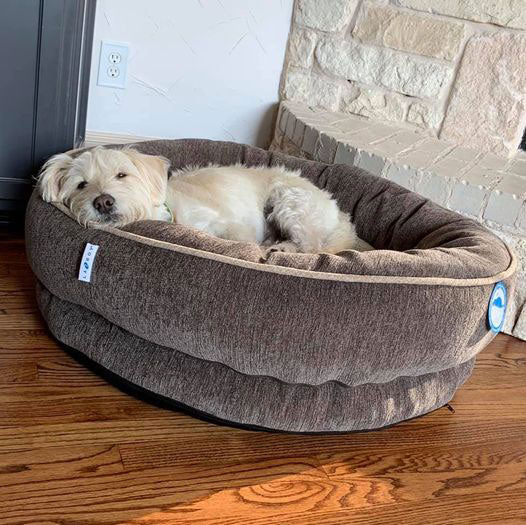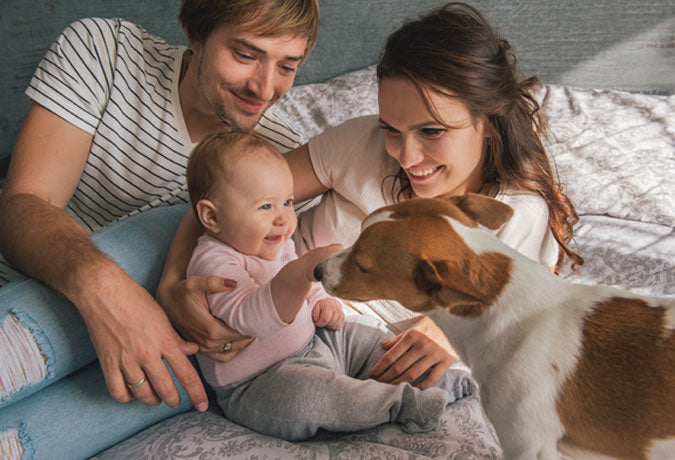Tips to Introducing Dogs To Babies

Many couples start their families by adopting a dog. One of the most popular reasons for this is that getting and raising a pet together is a way to deepen their commitment to each other as a couple. Raising a pet (or more) also adds an extra layer of responsibility that might serve as good "practice" before having children. A dog is often a popular choice, with many couples deciding to raise a dog together regardless of their plans to have children. Should that day ever come, it's important to remember that an event as monumental as a pregnancy (and the arrival of a new family member) can affect the dog in ways couples couldn't imagine. Therefore, it is important to prepare your dog for the arrival of your new addition. Keep reading for tips to introduce your dog to your baby.
MAKE A PLAN
One relevant step to introducing your dog to your baby is to make a plan. Despite the busy months before the baby's arrival, your fur baby is an essential part of the family and needs to be included in the plan. Ideally, four months before the big day, gradually introduce your dog to new experiences, sounds, sights, smells, and others that she'll likely encounter when you bring the baby home. Then, associate these new things with rewards. in the final month or two, you can anticipate the changes you'll make to your dog's daily routine and start making those changes.
INTRODUCING YOUR NEWBORN
The introduction is the most crucial step, and the one parents either look forward to or dread. The first meeting can make or break all the efforts you've made before your baby's arrival, so it's important to approach it with extreme care and consideration, both for your baby's safety and your dog's peace of mind. Try and calm your dog as much as possible. If the situation allows for it, take your dog on a long walk beforehand to drain as much energy and excitement. It's important to remember that upon entering your home, your dog will instantly be able to detect the new scent, in this case, the new baby. It might be easier if the new scent is somewhat familiar to your dog already. Allow your dog to sniff the baby at a respectful and safe distance. Be sure to hold on to your dog's collar or body and over time, let your dog get closer and closer. This teaches the dog to respect the baby as another leader of the house.
ESTABLISH BOUNDARIES

For your baby's safety, your pediatrician may recommend that you keep your dog separate from the baby during the night or anytime your baby is sleeping. If your dog slept in your room or in the same area you plan to keep your baby at night, you'll need to train your dog to sleep in a different area of the house. To do this, set up a nice and comfortable area for your dog in your living room or another room in the house. You can either get a plastic kennel that caters to your dog's natural denning instinct, or you can get a nice, comfortable bed for your dog. You can make kennels cozier with high-walled kennel mats and make a dog bed more welcoming with a blanket just for your dog. It's important to know your dog's sleep style before you run to the store and purchase a bed. Whichever you choose, make sure the area is welcoming and comfortable for your dog. This is an essential component in ensuring that your baby is safe, no matter how calm and well-behaved your dog might be. To help train your dog to know when they are and are not allowed to enter a room, utilize a baby gate.
TEACH YOUR BABY
In your child's exploratory state, make sure to supervise all interactions between your baby and your dog. This is a great opportunity to teach your child not to bother your dog too much, yank her tail, invade her space, or annoy her. Mutual respect lessons cannot begin early enough. Children may inadvertently provoke a dog because they were unsupervised by their parents or were not taught to respect their pets.
As your child develops, it's also important to teach him to respect your dog's safe zones, belongings, and the dog in general. Any interaction must also be supervised by parents to guide their children in properly communicating and playing with their dogs. It would be beneficial to everyone if you, as a parent, play an active role in the development of your child and your dog's relationship.

DON'T EVER FORGET ABOUT THE DOG
Understandably, raising a newborn is hard work in and of itself, but it doesn't mean that you have to forget about your dog. Luckily, your dog requires less attention than your newborn. Sometimes your dog may just need a quick belly rub, or a pat on the head to know you love them. As you get used to your new routine, you'll get more energy and it'll be easier to find more time for your pet. In the meantime, try to maintain your dog's routine as best you can, walk him when you can, and remember to consistently train him about what is and is not okay around the baby. As long as you feel secure, calm, and happy with your new routine, your dog will maintain a sense of normalcy.
Introducing your dog to your newborn baby may seem daunting or even scary, but it is the starting point for keeping peace and building strong relationships in your home. Follow these tips to help facilitate a healthy bond between your child and your pet. If their introduction is done right, a caring and loving relationship can be established and last for years to come.
Previous article

Next article

Related posts
View all-

National K9 Veterans Day: Why and How to Celebrate
National K9 Veterans Day is celebrated every year on March 13th. This year its on Saturday March 13th, 2024. This day was established to recognize and celebrate the contributions that Military Working Dogs.
Read Article -

Puppy Training Tips
Training your pup from day one helps set a solid foundation for good behavior and a well-adjusted adult dog. Puppies thrive on structure, and a predictable routine makes learning easier.
Read Article -

Spring Cleaning Tips for Pet Parents
Say goodbye to the winter germs and hello to all the new spring smells! The beginning of spring is the perfect time to clean your house. For pet owners, this can mean more in-depth cleaning in areas other people don't have to worry about. We will give you some helpful tips and tricks so that cleaning up after your pet seems a little less daunting. Read Article



